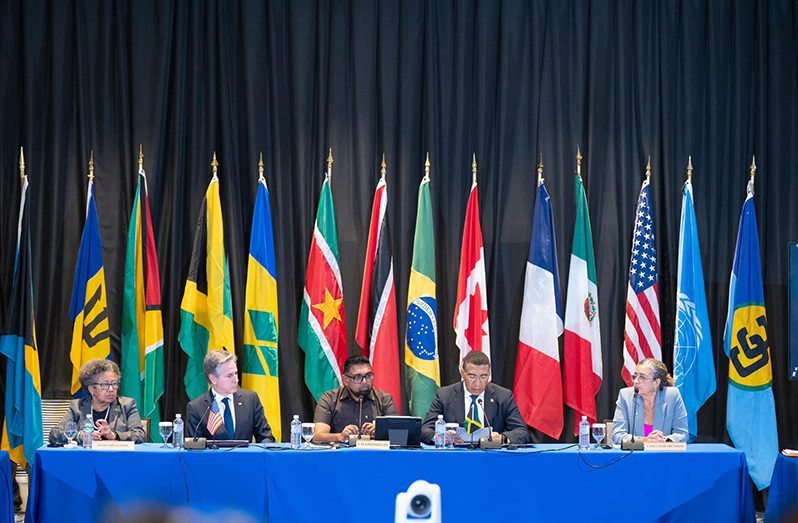–President Ali says after discussions conclude with decision for transitional governance council in Haiti, Prime Minister Henry’s agreement to resign
–outgoing Haitian official calls on citizens to remain calm, do everything to return peace, stability quickly
HAITI’S Prime Minister, Ariel Henry has resigned, paving the way for the establishment of a new transitional governance council, as the country inches closer to hosting fresh elections, President of Guyana and Chairman of CARICOM, Dr. Irfaan Ali has said.
At a Monday night press conference in Kingston, Jamaica, Dr. Ali said this arrangement will now make room for “a peaceful transition of power, continuity of governance an action plan for near term security and the road to free and fair elections.”
The CARICOM Chair, on Monday led meetings with several other regional leaders and international partners to address the increased waves of violence in Haiti.
“As a collective in CARICOM over the last seven to eight days, since Guyana, we have spent more time on Haiti than we have spent on our own local issues,” President Ali said.
WHAT COMES NEXT?
The CARICOM Chair explained that the transitional governance council will comprise seven voting members and two non-voting observers.
The seven voting members will include one representative from several Haitian stakeholder groups, including the private sector.
Meanwhile, the non-voting members will be represented by one member from civil society and one member of the inter-faith community.
“This process requires patience… Let us be patient; let us give a bit, let us sacrifice a bit and give this agreement a chance to work. This is just one step forward in many long steps ahead of us,” the CARICOM Chair added.
Delving into the details of the declaration, the CARICOM Chair said the council will ‘swiftly’ select and appoint an interim Prime Minister. The council and the selected Prime Minister will appoint an inclusive Council of Ministers.
Additionally, the council will hold the relevant and possible powers of the Haitian leadership during the transition period until an elected government is established.
According to the declaration, The Transitional Presidential Council will undertake the following:
Appoint an Inclusive Council of Ministers. Co-sign the orders decrees, and to sign off on the agenda of the Council of Ministers.
Set the essential criteria for the selection of an impartial Provisional Electoral Council and establish a Provisional Electoral Council.
Make arrangements for a peaceful transition and ensure continuity of governance and establish a National Security Council.
Continue collaboration with all members of the international community for accelerated deployment of the multinational Security Support Mission authorised by UN SCR 2699/ 2023.
According to the CARICOM Chair, it was agreed that the implementation of these measures will be concluded in parallel.
“These shared and individual commitments can represent important steps towards facilitating increased humanitarian access to help ease the suffering of the Haitian people. The international community stands ready to partner with Haiti to achieve these goals. Haitian participants must now fully implement their commitments,” Dr. Ali said.

‘HAITI NEEDS STABILTY’
Henry, in his address on Monday, said: “The government I am running will remove itself immediately after the establishment of the [transitional presidential] council.”
According to international news reports, heavily armed gangs attempted to take over Haiti’s main international airport, exchanging gunfire with police and soldiers in the most recent attack on important government locations in a wave of violence that also included a mass escape from the nation’s two largest prisons.
They wanted to stop 74-year-old Henry from returning from his trip to Kenya, which he visited to sign an agreement on the deployment of a multinational police force to the Caribbean Island.
“Haiti wants peace; Haiti needs stability, Haiti needs sustainable development, Haiti needs to rebuild democratic institutions. I’m asking all Haitians to remain calm and do everything they can for peace and stability to come back as fast as possible,” the Haitian leader said during a video address.
Over the last few weeks, CARICOM leaders have been engaged in deep discussions with stakeholders in Haiti and across the region, following intensified waves of violence in the sister state.
Two weeks ago, a collective decision determined that the regional bloc will take the lead in conducting a needs assessment to support the significant advancement in hosting elections in Haiti.
Leaders recently met in Guyana for the 46th Regular Meeting of the Conference of CARICOM Heads of Government.
Confidential meetings were conducted with Henry, who participated in the extended four-day summit.
At that meeting, it was revealed that a consensus was met for democratic elections to be held in the French-speaking state by August 2025.
MORE FUNDING FOR SECUIRTY, HUMANATARIAN AID
To further support the country, US Secretary of State Antony Blinken, who joined regional leaders in Jamaica on Monday, announced that the United States’ Department of Defence will double its support for the mission from US$100 million to US$200 million; this will bring the pledge to US$300 million. The US has also pledged US$33 million for humanitarian aid.
“Only the Haitian people should determine their own future, not anyone else but all of us, CARICOM, the United States, our other partners we can help…we can help restore foundation and security; we can address the tremendous suffering that innocent Haitians are experiencing,” Blinken said.
Aside from the US, international partners from Canada, France, and Mexico also engaged CARICOM leaders.
In 2018, protests began in communities throughout Haiti in response to increased fuel prices. Over time, those protests evolved into demands for the resignation of Jovenel Moïse, the then-president of Haiti, who was later assassinated on July 7, 2021 at his residence in the capital.



.jpg)











